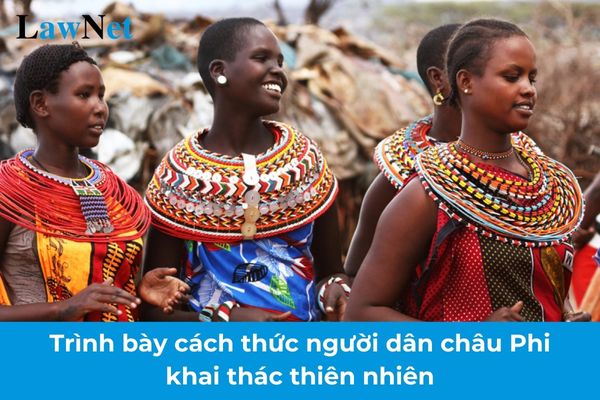How do African people exploit nature? What are regulations on assessment using comments for students of continuous education in lower secondary level in Vietnam?
How do African people exploit nature?
African people exploit nature in various ways based on the climate conditions, natural resources, and cultural traditions of each region. Below is a suggested presentation on how African people utilize nature that students can refer to.
1. Agriculture
- Shifting cultivation: In some areas, people practice slash-and-burn agriculture (growing crops on forest land after it is cleared, and after a period, move to new land).
- Permanent farming: In fertile plains such as the Nile River basin, people grow wheat, maize, cassava, and cash crops such as coffee and cocoa.
- Animal husbandry: Nomadic tribes commonly raise livestock (cattle, sheep, goats) in grassland or desert regions where land is difficult to cultivate.
2. Mineral resource exploitation
- Africa is rich in mineral resources such as gold, diamonds, oil, bauxite, and uranium. Locals and foreign companies exploit these resources, which often leads to disputes or negative environmental impacts.
- Example: South Africa is renowned for gold and diamond mining; Nigeria is a major oil producer in Africa.
3. Forestry
- People harvest timber from the tropical forests in Central Africa, particularly in the Congo River basin. The wood is used for construction, household items, or export.
- Additionally, they gather other natural products like honey, fruits, tree resin, and medicinal herbs.
4. Fishing
- In coastal areas, large lakes, and rivers like Lake Victoria or the Nile River basin, people fish for food and trade.
- However, overfishing or water pollution in some areas has affected the fish resources.
5. Using natural resources for livelihood
- People utilize water from rivers and streams for irrigation, daily living, and transportation.
- They use natural materials like clay, bamboo, and palm leaves to build houses and produce tools.
6. Ecotourism
- In some countries like Kenya and Tanzania, people leverage natural resources (such as wildlife reserves and beautiful landscapes) to develop tourism, creating significant income.
7. Limitations and Challenges
- Unsustainable exploitation of natural resources, lack of management, and climate change impacts have led to land degradation, deforestation, and substantial reductions in wildlife.
- Many local communities face difficulties because of the injustice in distributing benefits from natural resources, especially when foreign companies are involved in exploitation.
Note: The content is for reference only.

How do African people exploit nature? What are regulations on assessment using comments for students of continuous education in lower secondary level in Vietnam? (Image from Internet)
What are regulations on assessment using comments for students of continuous education in lower secondary level in Vietnam?
Based on Clause 1, Article 5 of Circular 43/2021/TT-BGDDT, the regulations on assessment using comments for students of continuous education in lower secondary level in Vietnam are prescribed as follows:
- Teachers use oral or written forms to comment on students' task performance, note their progress, outstanding strengths, and main limitations during the learning and practice process, and evaluate their learning and practice results.
- Students use oral or written forms to self-assess their task performance, progress, outstanding strengths, and main limitations.
- Parents of students or organizations, individuals participating in the student's education process provide feedback on the student's task performance.
- Assessment by comment of students' learning and practice results is used in regular evaluation through forms of tests and assessments appropriate to the specific characteristics of the subject.
What are levels of evaluation of learning outcomes for each semester of continuing education students at lower secondary level in Vietnam?
Based on Clause 2, Article 9 of Circular 43/2021/TT-BGDDT, evaluation of learning outcomes for each semester of continuing education students at lower secondary level in Vietnam is prescribed according to 04 levels as follows:
- Good Level: All subjects have average semester grades (ĐTBmhk), average yearly grades (ĐTBmcn) of 6.5 points or more, including at least 05 subjects with ĐTBmhk, ĐTBmcn of 8.0 points or more.
- Fair Level: All subjects have ĐTBmhk, ĐTBmcn of 5.0 points or more, including at least 05 subjects with ĐTBmhk, ĐTBmcn of 6.5 points or more.
- Pass Level: At least 05 (five) subjects have 5.0 points or more; no subject has a ĐTBmhk, ĐTBmcn of less than 3.5 points.
- Not Pass Level: All other cases.

